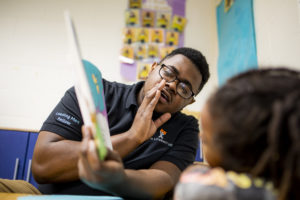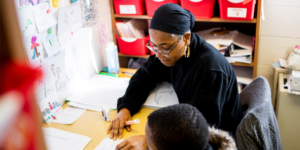The thing I love the most about working at The Literacy Lab is knowing that our program works. As the Director of Data and Evaluation, I have the privilege of seeing this evidence first hand. We have made a commitment to having a measurable impact. The Literacy Lab takes a strategic, data-informed approach to helping our students build the skills they will need in school and in life.
Literacy is the key to student success

There are many ways to make an impact on student academic outcomes. To maximize our impact, we focus on the one skill that underlies all the rest: literacy. All subjects require fluent, on-grade-level reading as a prerequisite to successfully engaging with the content. When I was a math teacher, I had many students whose struggles with math stemmed from their struggles with reading what was being asked of them and processing complex math vocabulary.
Students of all ages benefit from literacy intervention. At The Literacy Lab, we have narrowed our focus to the grades where we can have the greatest impact. We intervene as early as possible. Educators will be very familiar with the adage that third grade is the time when students stop learning to read and start reading to learn. Research shows that students who read proficiently by third grade are more likely to graduate high school. We work with students as young as Pre-K, when they’re entering the school system, up until third grade, just before that critical moment.
Finally, there are lots of ways to deliver literacy intervention. Research tells us that students who receive one-on-one tutoring make the most improvement in reading. As a result, we recruit a corps of full-time tutors and train them on a set of research-backed, high-impact literacy interventions.
In short, we take the most essential skill in education and apply intervention at the most efficient time using the strategies with the best record of impact. And that is the basis of our program.
Student data drives results
While we see this as a recipe for success, we know we can be even more intentional. Just because we know that our interventions have worked in the past does not guarantee that they are working for a particular student. Keeping careful tabs on this is what helps to ensure our program works.
Though successful reading requires a variety of skills, there are certain skills at each grade level that predict future success in reading. Our tutors can measure these skills in sixty seconds. That means that they can assess their students every week, without their students even knowing they are being assessed. Having a weekly measure of students’ growth helps us answer some essential questions:
Is the intervention working?
How fast are students growing?
Are they on track to catch up with their peers?
By looking at these trends, we can tell how close our students are to meeting their goals. Our expert coaches help guide tutors to change interventions if needed.
A recipe for success

We know how hard educators work to ensure that their students are succeeding. With our commitment to targeted intervention and data-based decision making, we can ensure that our tutors’ energy inspires the greatest impact. And our efforts have paid off. For Kindergarten students whose fall scores are below grade level, Literacy Lab tutoring triples their likelihood of meeting grade-level targets by the spring. Students who receive Literacy Lab interventions in all grade levels make several months of reading growth above their comparable peers, on average. Do not take my word for it; ask our principals. Across our regions, 100 percent of principals agree that our program is having a positive impact on their students.
Education is complex, and we are only one small part. But we are doing everything we can to make sure that our part is as effective as possible. It seems to be working. And that is pretty darn cool.
—
Connor Nowalk has been on staff with The Literacy Lab since 2016. Prior to joining the team, Connor shared his love of numbers with high school students as a math teacher in Washington, DC and Kansas City, MO. Connor holds a Masters Degree in Data and Strategy from the University of Missouri – Columbia.

